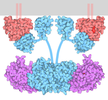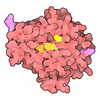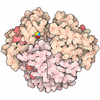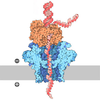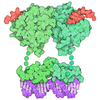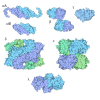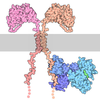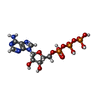+ Open data
Open data
- Basic information
Basic information
| Entry | Database: PDB / ID: 7zr0 | ||||||||||||||||||||||||||||||||||||||||||||||||||||||
|---|---|---|---|---|---|---|---|---|---|---|---|---|---|---|---|---|---|---|---|---|---|---|---|---|---|---|---|---|---|---|---|---|---|---|---|---|---|---|---|---|---|---|---|---|---|---|---|---|---|---|---|---|---|---|---|
| Title | CryoEM structure of HSP90-CDC37-BRAF(V600E) complex. | ||||||||||||||||||||||||||||||||||||||||||||||||||||||
 Components Components |
| ||||||||||||||||||||||||||||||||||||||||||||||||||||||
 Keywords Keywords | CHAPERONE / Complex / PROTEIN BINDING | ||||||||||||||||||||||||||||||||||||||||||||||||||||||
| Function / homology |  Function and homology information Function and homology informationregulation of type II interferon-mediated signaling pathway / HSP90-CDC37 chaperone complex / negative regulation of proteasomal protein catabolic process / Aryl hydrocarbon receptor signalling / aryl hydrocarbon receptor complex / CD4-positive, alpha-beta T cell differentiation / positive regulation of axon regeneration / histone methyltransferase binding / dynein axonemal particle / CD4-positive or CD8-positive, alpha-beta T cell lineage commitment ...regulation of type II interferon-mediated signaling pathway / HSP90-CDC37 chaperone complex / negative regulation of proteasomal protein catabolic process / Aryl hydrocarbon receptor signalling / aryl hydrocarbon receptor complex / CD4-positive, alpha-beta T cell differentiation / positive regulation of axon regeneration / histone methyltransferase binding / dynein axonemal particle / CD4-positive or CD8-positive, alpha-beta T cell lineage commitment / negative regulation of synaptic vesicle exocytosis / receptor ligand inhibitor activity / Signalling to p38 via RIT and RIN / head morphogenesis / positive regulation of type 2 mitophagy / ARMS-mediated activation / myeloid progenitor cell differentiation / endothelial cell apoptotic process / SHOC2 M1731 mutant abolishes MRAS complex function / Gain-of-function MRAS complexes activate RAF signaling / regulation of cyclin-dependent protein serine/threonine kinase activity / protein kinase regulator activity / ATP-dependent protein binding / negative regulation of fibroblast migration / positive regulation of D-glucose transmembrane transport / positive regulation of protein localization to cell surface / establishment of protein localization to membrane / positive regulation of axonogenesis / protein folding chaperone complex / regulation of T cell differentiation / Negative feedback regulation of MAPK pathway / Frs2-mediated activation / post-transcriptional regulation of gene expression / stress fiber assembly / Respiratory syncytial virus genome replication / telomerase holoenzyme complex assembly / positive regulation of transforming growth factor beta receptor signaling pathway / Drug-mediated inhibition of ERBB2 signaling / Resistance of ERBB2 KD mutants to trastuzumab / Resistance of ERBB2 KD mutants to sapitinib / Resistance of ERBB2 KD mutants to tesevatinib / Resistance of ERBB2 KD mutants to neratinib / Resistance of ERBB2 KD mutants to osimertinib / Resistance of ERBB2 KD mutants to afatinib / Resistance of ERBB2 KD mutants to AEE788 / Resistance of ERBB2 KD mutants to lapatinib / Drug resistance in ERBB2 TMD/JMD mutants / Uptake and function of diphtheria toxin / regulation of type I interferon-mediated signaling pathway / TPR domain binding / dendritic growth cone / face development / MAP kinase kinase activity / Assembly and release of respiratory syncytial virus (RSV) virions / thyroid gland development / protein phosphatase activator activity / Sema3A PAK dependent Axon repulsion / synaptic vesicle exocytosis / The NLRP3 inflammasome / somatic stem cell population maintenance / regulation of protein ubiquitination / positive regulation of peptidyl-serine phosphorylation / HSF1-dependent transactivation / MAP kinase kinase kinase activity / response to unfolded protein / HSF1 activation / Attenuation phase / negative regulation of endothelial cell apoptotic process / chaperone-mediated protein complex assembly / RHOBTB2 GTPase cycle / axonal growth cone / telomere maintenance via telomerase / postsynaptic modulation of chemical synaptic transmission / protein targeting / Purinergic signaling in leishmaniasis infection / : / positive regulation of stress fiber assembly / supramolecular fiber organization / DNA polymerase binding / heat shock protein binding / ERK1 and ERK2 cascade / Signaling by ERBB2 / positive regulation of substrate adhesion-dependent cell spreading / protein folding chaperone / peptide binding / negative regulation of proteasomal ubiquitin-dependent protein catabolic process / substrate adhesion-dependent cell spreading / cellular response to interleukin-4 / ESR-mediated signaling / HSP90 chaperone cycle for steroid hormone receptors (SHR) in the presence of ligand / cellular response to calcium ion / Constitutive Signaling by Overexpressed ERBB2 / thymus development / placenta development / animal organ morphogenesis / nitric-oxide synthase regulator activity / positive regulation of cell differentiation / ATP-dependent protein folding chaperone / Signaling by ERBB2 TMD/JMD mutants / Hsp90 protein binding Similarity search - Function | ||||||||||||||||||||||||||||||||||||||||||||||||||||||
| Biological species |  Homo sapiens (human) Homo sapiens (human) | ||||||||||||||||||||||||||||||||||||||||||||||||||||||
| Method | ELECTRON MICROSCOPY / single particle reconstruction / cryo EM / Resolution: 3.4 Å | ||||||||||||||||||||||||||||||||||||||||||||||||||||||
 Authors Authors | Oberoi, J. / Pearl, L.H. | ||||||||||||||||||||||||||||||||||||||||||||||||||||||
| Funding support |  United Kingdom, 1items United Kingdom, 1items
| ||||||||||||||||||||||||||||||||||||||||||||||||||||||
 Citation Citation |  Journal: Nat Commun / Year: 2022 Journal: Nat Commun / Year: 2022Title: HSP90-CDC37-PP5 forms a structural platform for kinase dephosphorylation. Authors: Jasmeen Oberoi / Xavi Aran Guiu / Emily A Outwin / Pascale Schellenberger / Theodoros I Roumeliotis / Jyoti S Choudhary / Laurence H Pearl /  Abstract: Activation of client protein kinases by the HSP90 molecular chaperone system is affected by phosphorylation at multiple sites on HSP90, the kinase-specific co-chaperone CDC37, and the kinase client ...Activation of client protein kinases by the HSP90 molecular chaperone system is affected by phosphorylation at multiple sites on HSP90, the kinase-specific co-chaperone CDC37, and the kinase client itself. Removal of regulatory phosphorylation from client kinases and their release from the HSP90-CDC37 system depends on the Ser/Thr phosphatase PP5, which associates with HSP90 via its N-terminal TPR domain. Here, we present the cryoEM structure of the oncogenic protein kinase client BRAF bound to HSP90-CDC37, showing how the V600E mutation favours BRAF association with HSP90-CDC37. Structures of HSP90-CDC37-BRAF complexes with PP5 in autoinhibited and activated conformations, together with proteomic analysis of its phosphatase activity on BRAF and CRAF, reveal how PP5 is activated by recruitment to HSP90 complexes. PP5 comprehensively dephosphorylates client proteins, removing interaction sites for regulatory partners such as 14-3-3 proteins and thus performing a 'factory reset' of the kinase prior to release. | ||||||||||||||||||||||||||||||||||||||||||||||||||||||
| History |
|
- Structure visualization
Structure visualization
| Structure viewer | Molecule:  Molmil Molmil Jmol/JSmol Jmol/JSmol |
|---|
- Downloads & links
Downloads & links
- Download
Download
| PDBx/mmCIF format |  7zr0.cif.gz 7zr0.cif.gz | 376.5 KB | Display |  PDBx/mmCIF format PDBx/mmCIF format |
|---|---|---|---|---|
| PDB format |  pdb7zr0.ent.gz pdb7zr0.ent.gz | 288.9 KB | Display |  PDB format PDB format |
| PDBx/mmJSON format |  7zr0.json.gz 7zr0.json.gz | Tree view |  PDBx/mmJSON format PDBx/mmJSON format | |
| Others |  Other downloads Other downloads |
-Validation report
| Arichive directory |  https://data.pdbj.org/pub/pdb/validation_reports/zr/7zr0 https://data.pdbj.org/pub/pdb/validation_reports/zr/7zr0 ftp://data.pdbj.org/pub/pdb/validation_reports/zr/7zr0 ftp://data.pdbj.org/pub/pdb/validation_reports/zr/7zr0 | HTTPS FTP |
|---|
-Related structure data
| Related structure data |  14875MC 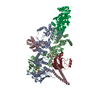 7zr5C 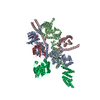 7zr6C M: map data used to model this data C: citing same article ( |
|---|---|
| Similar structure data | Similarity search - Function & homology  F&H Search F&H Search |
- Links
Links
- Assembly
Assembly
| Deposited unit | 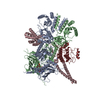
|
|---|---|
| 1 |
|
- Components
Components
| #1: Protein | Mass: 86223.469 Da / Num. of mol.: 2 Source method: isolated from a genetically manipulated source Source: (gene. exp.)  Homo sapiens (human) / Gene: HSP90AB1, HSP90B, HSPC2, HSPCB / Production host: Homo sapiens (human) / Gene: HSP90AB1, HSP90B, HSPC2, HSPCB / Production host:  Spodoptera (butterflies/moths) / References: UniProt: P08238 Spodoptera (butterflies/moths) / References: UniProt: P08238#2: Protein | | Mass: 46853.816 Da / Num. of mol.: 1 / Mutation: V600E Source method: isolated from a genetically manipulated source Source: (gene. exp.)  Homo sapiens (human) / Gene: CDC37, CDC37A / Production host: Homo sapiens (human) / Gene: CDC37, CDC37A / Production host:  Spodoptera (butterflies/moths) / References: UniProt: Q16543 Spodoptera (butterflies/moths) / References: UniProt: Q16543#3: Protein | | Mass: 90934.508 Da / Num. of mol.: 1 Source method: isolated from a genetically manipulated source Source: (gene. exp.)  Homo sapiens (human) / Gene: BRAF, BRAF1, RAFB1 / Production host: Homo sapiens (human) / Gene: BRAF, BRAF1, RAFB1 / Production host:  Spodoptera (butterflies/moths) Spodoptera (butterflies/moths)References: UniProt: P15056, non-specific serine/threonine protein kinase #4: Chemical | Has ligand of interest | Y | Has protein modification | Y | |
|---|
-Experimental details
-Experiment
| Experiment | Method: ELECTRON MICROSCOPY |
|---|---|
| EM experiment | Aggregation state: PARTICLE / 3D reconstruction method: single particle reconstruction |
- Sample preparation
Sample preparation
| Component | Name: HSP90-CDC37-BRAF(V600E) complex / Type: COMPLEX / Entity ID: #1-#2 / Source: RECOMBINANT |
|---|---|
| Source (natural) | Organism:  Homo sapiens (human) Homo sapiens (human) |
| Source (recombinant) | Organism:  Spodoptera (butterflies/moths) Spodoptera (butterflies/moths) |
| Buffer solution | pH: 7.5 |
| Specimen | Embedding applied: NO / Shadowing applied: NO / Staining applied: NO / Vitrification applied: YES |
| Vitrification | Cryogen name: ETHANE |
- Electron microscopy imaging
Electron microscopy imaging
| Experimental equipment |  Model: Titan Krios / Image courtesy: FEI Company |
|---|---|
| Microscopy | Model: FEI TITAN KRIOS |
| Electron gun | Electron source:  FIELD EMISSION GUN / Accelerating voltage: 300 kV / Illumination mode: FLOOD BEAM FIELD EMISSION GUN / Accelerating voltage: 300 kV / Illumination mode: FLOOD BEAM |
| Electron lens | Mode: BRIGHT FIELD / Nominal defocus max: 2500 nm / Nominal defocus min: 1300 nm |
| Image recording | Electron dose: 45 e/Å2 / Film or detector model: FEI FALCON IV (4k x 4k) |
- Processing
Processing
| Software | Name: PHENIX / Version: 1.20.1_4487: / Classification: refinement | ||||||||||||||||||||||||
|---|---|---|---|---|---|---|---|---|---|---|---|---|---|---|---|---|---|---|---|---|---|---|---|---|---|
| EM software |
| ||||||||||||||||||||||||
| CTF correction | Type: NONE | ||||||||||||||||||||||||
| 3D reconstruction | Resolution: 3.4 Å / Resolution method: FSC 0.143 CUT-OFF / Num. of particles: 400624 / Symmetry type: POINT | ||||||||||||||||||||||||
| Refine LS restraints |
|
 Movie
Movie Controller
Controller





 PDBj
PDBj